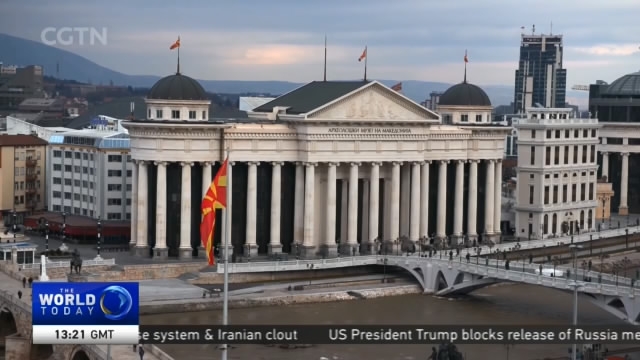
21:51, 10-Feb-2018
Macedonia Name Controversy: Macedonia struggles to get world to recognize its constitutional name

Turning now to the country officially known as the "Former Yugoslav Republic of Macedonia". For a quarter of a century, it's been struggling to persuade the world to call it simply the "Republic of Macedonia". Its main obstacle has been Greece, which insists the name 'Macedonia' can only be used for its own northern region. Now, after years of stalemate, it appears the two countries may be close to a solution. Aljosa Milenkovic reports from the Macedonian capital.
This makeover of Skopje's city center cost almost 700 million US dollars back in 2014. Antique Greek style buildings, a 25 meter statue of Alexander the Great, hundreds and hundreds of tons of shining white marble and a whole lot of controversy. This project is provoking angry reactions from Athens, with claims that the architecture actually stolen Greek historical legacy. They also say this show of cultural heritage has nothing to do with the country that the United Nations recognizes as the Former Yugoslav Republic of Macedonia. But locals in Skopje are rejecting these accusations. They say Alexander the Great, or Alexander of Macedonia was one of them, and claim the project is just overpriced or kitsch.
MARTIN PANOVSKI, PRESIDENT ARCHITECTS ASSOSCIATION OF MACEDONIA "This is not architecture in 21st century. This is literally kitsch. Looking from the outside it is literally kitsch. It should be pleasing for the eye, attractive for masses and tourists. And that's the definition of kitsch."
The city square is just one of the many sources of tensions between the two countries. Skopje airport was another. Just days ago, the government announced the airport will no longer bear the name "Alexander the Great". Nor will the country's main highway.
ALJOSA MILENKOVIC SKOPLJE, MACEDONIA "It wasn't long ago that you could see huge road signs spelling out 'Alexander of Macedon Highway'. But all signs were torn down and systematically removed almost immediately, after the government decided to rename both this highway and the airport."
This unilateral move by the Macedonian government signals an openness to compromise with Greece on a final solution.
ZORAN ZAEV MACEDONIAN PRIME MINISTER "I'm an optimist. The solution can be found. It will be very hard. It won't be easy, and we didn't expect it to be easy, or something on the side of the road, that is easy to pick up. We are dedicated to it, the government, ministers, me. I'm confident that the solution can be found."
Risto Nikovski is a former Macedonian ambassador. He showed me his pictures with Vladimir Putin, leaders of the People's Republic of China, Tito, Margaret Thatcher and many other heavyweights he met during his career. He says this deal, that is about to be reached with Greece, is just a capitulation of national interests. According to him, it is the result of huge pressure on both sides.
RISTO NIKOVSKI FORMER MACEDONIAN AMBASSADOR "I have to say that for the first time in the last 25 years, I can see that Greece is under serious pressure to accept a solution which would be very hard to swallow. And the pressure comes from the United States, whose key interest is the quick entry of Macedonia into NATO in order to secure the southern flank of the Alliance."
It is widely circulated both in Skopje and Athens that this historic deal will be reached by June. The doors will be open for Macedonia's entry to NATO and the European Union, but it'll also for sure make many people unhappy. Aljosa Milenkovic, CGTN, Skopje.

SITEMAP
Copyright © 2018 CGTN. Beijing ICP prepared NO.16065310-3
Copyright © 2018 CGTN. Beijing ICP prepared NO.16065310-3